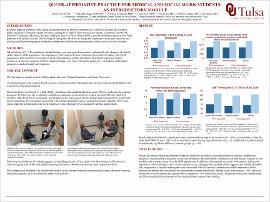| dc.description.abstract | BACKGROUND: Research suggests members of the sexual and gender minority (SGM) community fail to seek out medical care despite a higher prevalence of negative health outcomes, ranging from implicit bias to structural violence. In response, the OU-TU School of Community Medicine, the Anne and Henry Zarrow School of Social Work, and the Simulation Center at OU-Tulsa partnered with faculty from the OSU College of Osteopathic Medicine to design and implement a three-part education and training module promoting queer-affirmative practice among medical school and social work students.
METHODS: This introductory module begins with a lecture-based overview of human sexuality that emphasizes caring for the specific healthcare and social needs of SGM populations. The initial lecture is followed by a high-fidelity simulation with standardized patient actors (SPs) to implement the practices discussed. To better provide an authentic simulation experience, special attention is taken to recruit SPs who identify as members of the LGBTQIA+ community. The simulation cases begin with a patient presenting a complaint of anxiety related to SGM status, requiring students to work collaboratively to adequately address those needs. Skills emphasized throughout the simulation include interprofessional communication, queer-affirmative practice, expressing empathy and building rapport with patients. Finally, all students engage in a debriefing process—first as pairs with their respective SPs, then as a collective group with all SPs and training facilitators. All participants (N = 24) completed a standardized pre-post educational assessment, evaluating the development of clinical skills related to SGM populations, the importance of this material to their profession, their comfort working with SGM populations, their confidence in working with SGM populations, and the importance of affirmative practice to their profession.
RESULTS: A repeated measures ANOVA analyzed changes over time, both within groups (i.e., all students) and between groups (i.e., medical/social work students). Results indicated statistically significant improvements within groups on all measures (p < .05) except attitudes (a subscale of the LGBTDOCSS) (p = .382) with all significant results having large effect sizes (η2p > .2). Additionally, results indicated no statistically significant difference between groups (p > .05). In sum, the results validate the affirmative-practice module as an effective teaching method for students, regardless of discipline.
CONCLUSION: The results of this study illustrate the capabilities of interdisciplinary education in the form of didactics and high-fidelity simulation to educate students on how to address the complex issues faced by SGM populations. | en_US |

